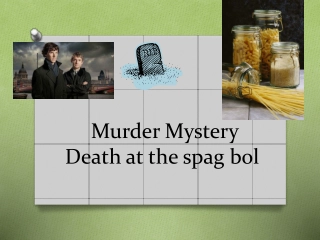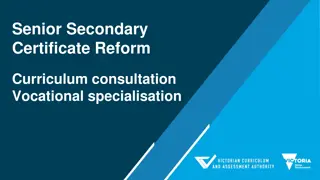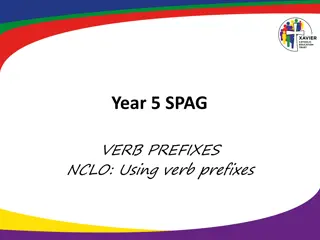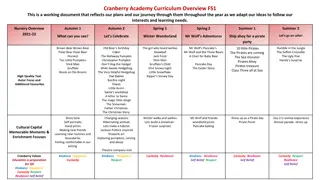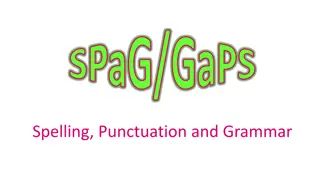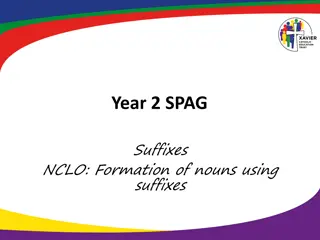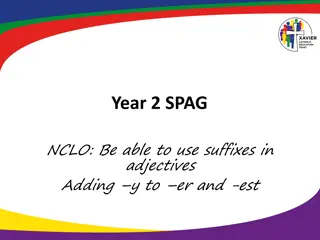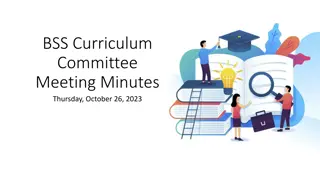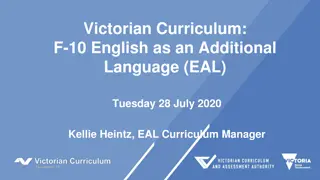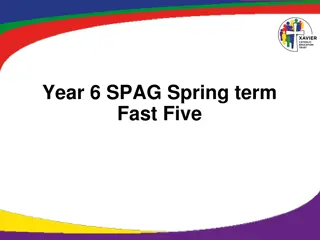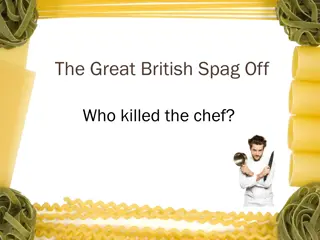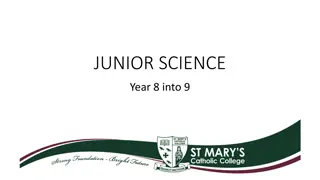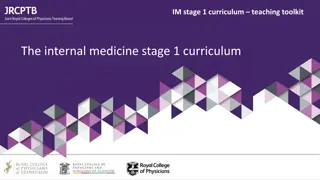Year 5 & 6 SPAG Curriculum Overview
Explore the Year 5 & 6 SPAG curriculum covering prefixes, suffixes, nouns, pronouns, adverbs, clauses, modal verbs, adverbials, cohesion, and punctuation. Understand how to convert words, form sentences, and enhance writing skills.
Download Presentation

Please find below an Image/Link to download the presentation.
The content on the website is provided AS IS for your information and personal use only. It may not be sold, licensed, or shared on other websites without obtaining consent from the author.If you encounter any issues during the download, it is possible that the publisher has removed the file from their server.
You are allowed to download the files provided on this website for personal or commercial use, subject to the condition that they are used lawfully. All files are the property of their respective owners.
The content on the website is provided AS IS for your information and personal use only. It may not be sold, licensed, or shared on other websites without obtaining consent from the author.
E N D
Presentation Transcript
Year 5 & 6 SPAG Wednesday 18thNovember 2020 Mr Chavhunduka Year 6 Miss Sassoon - Year 5
Year 5 word Prior knowledge Prefix Suffix Year 5 Convert nouns and adjectives into verbs using suffixes -ify, -ate, - ise Beautiful adjective Formula noun Critic noun Beautify verb Formulate verb Criticise verb Class noun Assassin noun Terror noun Classify verb Assassinate verb Terrorise adjective -mis -dis -de -re -over Using prefixes to alter the meaning of verbs misunderstood disappear misguided distrust deconstruct regroup overload overjoyed decode redo overcoat overhang
Year 5 sentence Prior knowledge Nouns name or label Pronouns used in place of a noun Relative pronouns who, which, that, whom, whose Clause basis of a sentence Year 5 Relative clause The shoes that I bought are so comfy! Our sofa, which is still extremely comfortable, looks rather old. The boy, who was crying, had fallen over.
Year 5 Sentence Prior knowledge Adverbs describe the verb, adjective, adverb or phrase to show how, where, when, how often Verbs engine of the sentence Year 5 Adverbs to indicate degrees of possibility certainly - definitely - maybe - possibly clearly - obviously - perhaps - probably Modal verbs (auxiliary) helper verbs that support main verb to indicate: level of possibility, level of ability, show obligation and give permission can - could - may - might - must shall - should - will - would
Year 5 text Prior knowledge Paragraph Year 5 Cohesion (making links) between one sentence and the next When, then, after that, alternatively Cohesion between one paragraph and the next Using adverbials to show shifts in time, place, viewpoint or topic: later on, back at the house, on the other hand
Year 5 punctuation Prior knowledge Year 5 ( ) Brackets , -dashes or , commas to show parenthesis To show additional information Brackets (which always come in pairs) are a form of punctuation. The lost cat which had now been missing for three days looked small, tired and hungry. The girl, who was extremely short for her age, was not allowed on the rollercoaster. Rules: (a). or (A.) To clarify meaning and/or avoid ambiguity Let s eat Grandma. vs Let s eat, Grandma. Rachel enjoys cooking her family and her dog. vs Rachel enjoys cooking, her family, and her dog
Whats new this year? www.spag.com What? SPaG tests children complete online. Can range from general tests, to concept specific, to past paper tests. When? embedded in their homework agenda. At home or in school if needed (note in diary if this is needed) Why? help build test skills aside from class time, help us track what they need further support on and look at each child individually more effectively, to tailor teaching and support from assessment and to allow children extra revision of SPaG.
YEAR 6 -WORD Prior knowledge Vocabulary Year 6 Informal and formal vocabulary Informal Formal Rich Wealthy Place Location Plant eaters Herbivores Died out Extinct Job Occupation Synonyms (same) and Antonyms (opposite )
Year 6 - sentence Year 6 Subjunctive form Formal Special mood of the verb Wishes, conditions and non factual expressions Not common Write using the starter of If I were ________________, Finish sentence with I would ___________
Year 6 - sentence Year 6 Informal and formal speech Informal Formal Contractions -can t -cannot Sentence can end with a preposition Sentence cannot end with a preposition Deletionof relative pronouns Use of relative pronouns
Year 6 - sentence Year 6 Active voice subject performs the action She stole the wallet. As a class, we heated the test tube. Passive voice subject has action done to it The wallet had been stolen. The test tube was heated.
YEAR 6 -TEXT Layout devices Some ways of helping the reader see how your ideas are organised. Headings and subheadings give an overview of the text s organisation. Punctuation showswhere one chunk of meaning ends and another begins. Paragraph breaks -to show shifts of time, place, viewpoint, topic, etc. Presentational devices draw attention to sections of text and make meaning clearer speech bubbles, timelines, flowcharts, bullet points, boxed information, tables or columns etc.
YEAR 6 -TEXT Cohesive devices conjunctions These show links between ideas within a sentence, e.g. when, because, until, although. adverbials Words and phrases can act like signposts to help readers see significant links in the text. Words and phrases that show links between one sentence and the next, e.g. However, Consequently, On the other hand, In contrast repetition punctuation Some punctuation marks (: ; -) can show links between clauses whilst shows something is missing. Repeated words or phrases pronouns To avoid awkward repetition of nouns and noun phrases
Year 6 Punctuation : Colons used to introduce closely related information where one clause introduces the next clause or phrase. The weather was deteriorating rapidly: she would not go out today. : Colons to introduce a list ;Semi colon separate off closely related items within a sentence It was the best of days; it was the worst of days. ;Semi colon within lists
Year 6 Punctuation Dashes separate (longer than a hyphen) And the winner is Angela! The lost cat which had now been missing for three days looked small, tired and hungry. From pages 82 99 Hyphens link Brother-in-law Recovering from an illness, re-covering a chair Man eating shark, man-eating shark (to avoid ambiguity). Bullet points - to list
BBC Bitesize- http://www.bbc.co.uk/bitesize/ks2/english/spelling_gramm ar/ Fun English games http://www.funenglishgames.com/grammargames.html https://www.englishgrammar.org/quiz/











